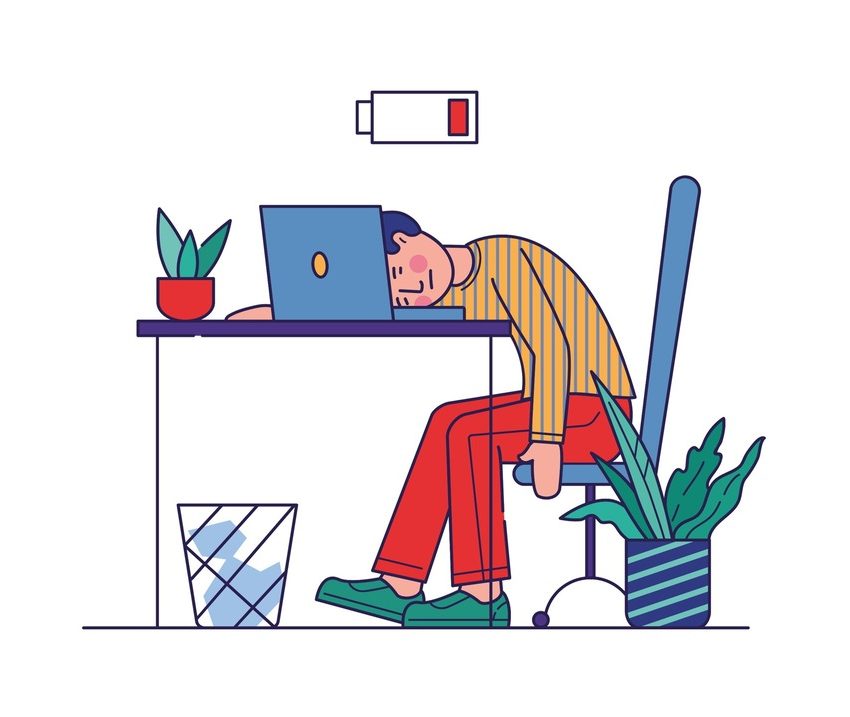*The opinions expressed in this article are the author’s own and do not reflect the official views of ICMR.

Recently, while doomscrolling, I came across a TikTok video that stopped me mid-scroll. It said that the reason we’re always tired, even after “rest”, is because we’re rarely truly resting anymore. Sure, we might be lying on the couch or sitting in bed, but our brains are still constantly switched on as we flick through an infinite loop of Instagram reels, scroll Netflix menus, or agonise over dinner options on GrabFood option. Our bodies may be still, but our minds are constantly buzzing.
And it struck me: when was the last time I was really, properly bored?
Here are just a few personal examples of how overstimulated my brain has become:
- I automatically reach for my phone every time I have a spare minute. In the lift. While waiting for a meeting to start. Sometimes, even while watching a TV show (because apparently one screen isn’t enough).
- I am always listening to a podcast or audiobook, be it on my morning run, while I am driving, when I am cooking dinner, even while brushing my teeth!
- And, confession: in the middle of writing this very piece, I absent-mindedly took out my phone and started scrolling. Evidently, I no longer have any capability to focus.
Essentially, we are almost never bored these days. It’s virtually impossible unless you’re marooned on a desert island without Wi-Fi. But what has this elimination of boredom done to us?
Losing Our Attention Span
The first casualty is attention. The more stimulation we pile on, the less capable we are of sitting with anything for long.
We’re never mentally at rest. Even in the tiny gaps of the day, like the elevator ride, the queue at the café, or the few minutes before sleep, we fill the silence. That means our brains never get a breather. Information pours in constantly, but we rarely take the time to digest it. We skim articles, scroll Twitter threads, and save Instagram Reels for “later,” but how much of it actually sticks?
Some studies suggest the average human attention span has dropped from 12 seconds in 2000 to just 8 seconds today, which means congratulations, your attention span is now shorter than that of a goldfish. I think it’s safe to say that many of us now find it harder to sit with a book or even a long article without your mind wandering off midway. And there’s a science to this – our brains have gotten used to the influx of dopamine that floods our reward systems each time we scroll through our phones, and over time our nervous system has gotten used to these dopamine hits – just like how addicts are always looking for that one more nicotine hit, or glass of whiskey.
Losing Our Creativity
Boredom used to be fertile ground for imagination. Think of Isaac Newton supposedly sitting under a tree, when a falling apple sparked his thoughts on gravity. Or even how sometimes you get random ideas when you’re showering and just letting your thoughts wander. Now, how often have you gotten these sparks while multitasking between emails and TikToks?
Historically, there has been a reason why patrons have funded artists residencies and retreats, to give artists the stillness and peace of mind to be creative. When we’re never bored, we leave little room for our own ideas to bubble up. Instead, our mental canvas is always covered by other people’s content.
Even our hobbies, once sources of pure fun, are now tied to productivity. If someone is good at baking, we say they should start selling sourdough bread. Reading for pleasure often gets replaced with self-help or “productive” non-fiction. Even fiction has been co-opted into trends like #BookTok, where readers demand to know what the “tropes” are before committing to reading a book. It seems like we’ve all gotten so used to everything summarised with a TLDR that want the story without the meandering – even when it is supposedly for leisure and enjoyment. We are so afraid of even the possibility of being bored, that we risk losing the joy of simply doing things for their own sake.
Losing Self-Reflection and Emotional Processing
Boredom isn’t just good for ideas, it is also good for our inner selves. It gave us a chance to sit with our thoughts, to process emotions, and to work through the noise of the day.
Jonathan Haidt’s recent book The Anxious Generation talks about the importance of free play in child development, and how screens are robbing kids of that crucial space. He highlighted that through boredom and consequently free play, children built their own resilience, and social and emotional competence. In a world where boredom is immediately filled by smartphones, Haidt argues that it has contributed to rising childhood anxiety, depression, and social disconnection.
But what if this doesn’t just apply to children. What if adults too need play—and boredom—for our own growth? When every quiet moment is replaced by content consumption, when do we actually reflect on who we are, what we want, or how we feel?
In a 2014 experiment conducted by the University of Virginia , participants were seated alone in a quiet, empty room with nothing to do—except they had access to a button that would deliver an electric shock to their ankle which they had previously described as “unpleasant.” In their 15 minutes of solitude, 67 percent of the men and 25 percent of the women chose to shock themselves instead of simply sitting quietly.
This says something about how deeply uncomfortable boredom has become, and it begs the question of why we have become so afraid of our own thoughts when there is nothing to distract us. Is it any coincidence that almost all major faiths and beliefs in the world prescribe time of quiet prayer, meditation, and reflection as a necessary component for the soul?
Losing Human Connection
Quite ironically, the less bored we are and the more we are connected online, the more it also chips away at how we connect with others in real life.
Think about those little micro-moments of human interaction: making small talk while waiting in line, smiling at a stranger on the train, or even just looking around and noticing the world. Now, most of us spend that time glued to our screens. We’ve all seen groups of people who are out to dinner together yet they’re each on their phones.
There has been recent media and online discourse about whether or not Gen Z are “socially awkward”, “too anxious to function”, or just lonely. But if you’ve never had to endure a boring bus ride without headphones, when do you learn to strike up conversation? When do you learn to sit in silence with another person, without filling the gap with notifications?
We’ve outsourced boredom to devices, but in the process, we’ve outsourced opportunities for connection too.
The Irony of Buying Back Boredom
Here’s the ultimate irony (or maybe not, seeing that we are truly living in late-stage capitalism): boredom has now become a luxury good.
People now pay good money to “switch off”: Phone-free meditation retreats. Digital detox camps. Floating tanks and sensory deprivation pods. Even apps that lock you out of your own phone are sold as productivity hacks. These are marketed as premium experiences, when really, all they’re offering is what humans used to have by default: silence, stillness, a moment to ourselves.
It shouldn’t take thousands of ringgit and a flight to Bali to do what sitting in your living room without your phone could also achieve. Yet because boredom has been so thoroughly erased from daily life, it’s become something that can be commoditised. When the attention of the masses have been captured, then NOT having your attention stolen becomes a premium good.
It’s a strange paradox, that we’ve built a world so relentlessly stimulating, that people now spend money to be left alone with their thoughts. Unfortunately and scarily, this also implies that down the line, only people who have the money will be able to be left alone with their thoughts. What will this mean for the already fragile fabric of our social cohesion, if the next level of social fragmentation occurs between those who can afford to have clarity of mind vs those whose minds are always cluttered in noise?
Where do we go from here?
There’s always a risk, writing about this, of sounding like a preachy sermon from a Luddite hermit. So let’s be honest. Technology has kept us informed, connected and entertained. I don’t want to give up the podcasts that keep me company while I cook, or the audiobooks that turn long drives into something enjoyable. And the irony is not lost on me that I was inspired to write this piece after watching a Tiktok. The problem isn’t that we use these tools—it’s that we’ve forgotten how to not use them.
Maybe the solution isn’t to wage war on screens but to practice “curated boredom.” Building intentional gaps into the day. Going for a walk without headphones. Leaving the phone at home for errands. Doing chores in silence. Sitting in a café while waiting for a friend, without immediately opening Instagram. Little pockets of nothingness, reclaimed from the digital tide.
We’re beginning to see early signs of people craving this shift. The quiet popularity of movements like reading in the park, where strangers gather outdoors just to sit and read together, suggests a growing hunger for low-stakes, device-free community. Board game nights, crafting circles, community gardens: these aren’t new inventions, but they feel newly radical in a culture that treats every second as an opportunity for content or productivity.
All of these signal a demand for a time to put down our phones and to take a pause, and perhaps remember what it’s like to simply be. In reclaiming boredom, we might just reclaim a little more humanity too.


